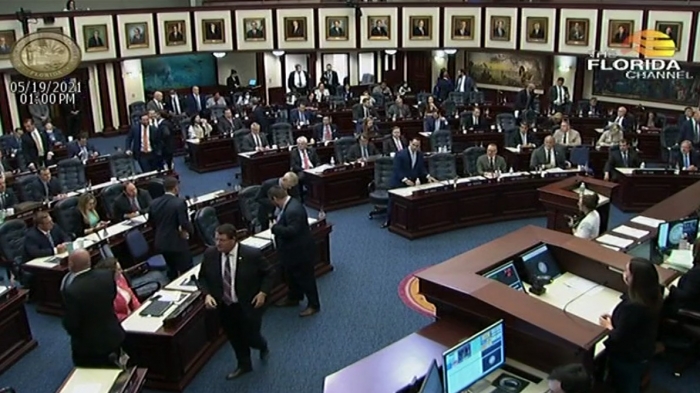The Legislature approved a new compact with the Seminoles, who will have full Vegas-style casinos
T
he Florida House on Wednesday voted 97-17 in favor of the new 30-year gambling deal between Gov. Ron DeSantis and the Seminole Tribe of Florida, which will bring an average of $500 million a year in new revenue to the state.
The Florida Senate approved the deal Tuesday in a 38-1 vote, but the agreement still needs federal approval, and the U.S. Department of Interior has 45 days after the bill is signed by DeSantis to make a decision. Sports betting under the deal can’t begin until Oct. 15., and lawsuits from groups opposed to the expansion of gambling could delay the start date further.
“The breakdown of the 2010 compact has denied the state of Florida any revenue derived from the Seminole Tribe’s ongoing gaming operations — including what is the most profitable casino in the United States, located in Hillsborough County. This changes today,” DeSantis said in a statement issued by his office. “With this new compact, the state will now see a large stream of reoccurring revenue to the tune of billions of dollars over the next few years.”
“Today, all the people of Florida are winners, thanks to legislative approval of the Gaming Compact between the State of Florida and the Seminole Tribe of Florida,” Seminole Tribe of Florida Chairman Marcellus Osceola Jr. said.
“Congratulations on an historic compact with the Seminole Tribe of Florida,’’ said House Speaker Chris Sprowls, R-Palm Harbor, at the conclusion of the vote, as reported by Tampa Bay Times, adding that the complex proposal “was a difficult one to navigate.”
The deal is fraught with precedent-setting implications for the nation and Native American tribes, which could use Florida’s model to negotiate similar arrangements in other states. It is also expected to draw legal challenges over its constitutionality. If the state clears those hurdles, anyone in Florida over age 21 can start playing the games on their cellphone on Oct. 15.
The Seminole Tribe’s Hard Rock casinos in Broward and Hillsborough counties also will have full Las Vegas-style casinos with the addition of roulette and craps, and mobile sports betting will be allowed through online apps managed by the Tribe as well as Florida’s existing racetracks and jai-alai frontons. The tribe will also get to build three new casinos on its Hollywood reservation.
“We’re going to allow the Seminole Tribe to offer sports betting where you can be sitting in your bathtub or sitting on your couch, thinking about a football game and you can make a wager, regardless of where you physically are, on your cellphone,’” said Rep. Randy Fine, R-Palm Bay, the House chair of the Select Committee on Gaming.
The House approved the deal after refusing to address a series of Democratic amendments that attempted to direct the spending of proceeds from the Tribe to education and other social service programs. Sen. Jeff Brandes, R-St. Petersburg, was the lone no vote in the Senate, and Sen. Randolph Bracy, D-Orlando, did not vote.
Sen. Travis Hutson, R-St. Augustine, called the compact a “great deal” that will allow the Legislature to “plug holes in the budget” and spending priorities for years to come. Hutson added the compact includes a major concession to the 26 racetracks, jai-alai frontons and racinos around the state. Under the plan, the Tribe will no longer object to having existing parimutuels operate designated-player card games, a hybrid between blackjack and poker which the Tribe has long considered competition to its blackjack operations.
Another measure (SB 8-A) approved Wednesday will create a five-member, governor-appointed Gaming Control Commission that will be in charge of enforcing gambling rules and regulations.
Even those opposed to the deal approved of the new commission, which they believe will have greater enforcement powers to crack down on unauthorized gambling outfits. Plakon cited the recent sprouting of internet cafes as an example of what the new commission is likely to target.
The last bill approved by the House Wednesday allows harness and quarter horse tracks to end live racing while continuing to offer other forms of gambling, a provision known as “decoupling.” Thoroughbred horse tracks, however, were carved out of the bill, and those involved with breeding and racing standard-bred horses used in harness races were angered at the move, saying it will hurt their industry.



